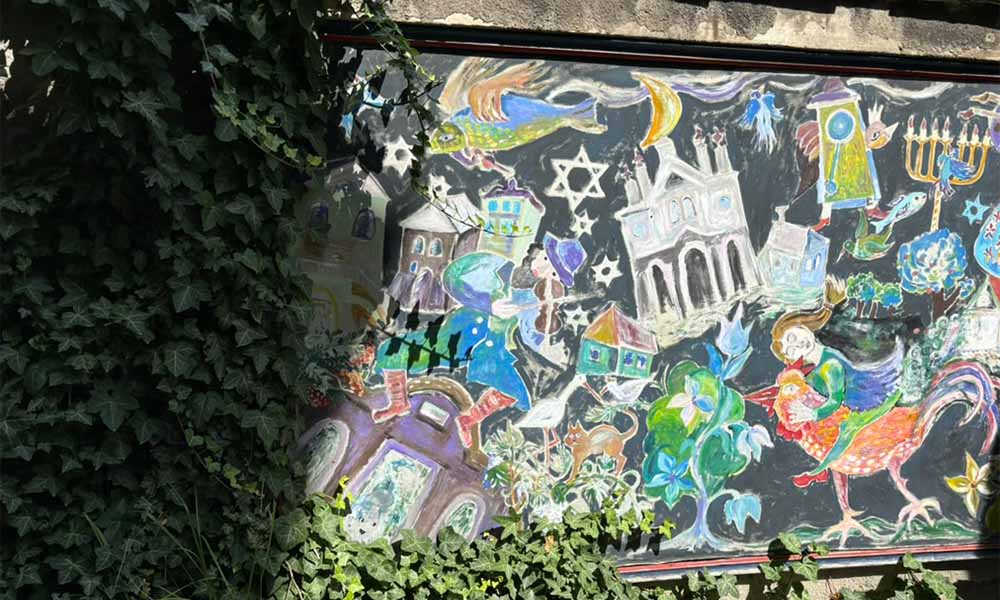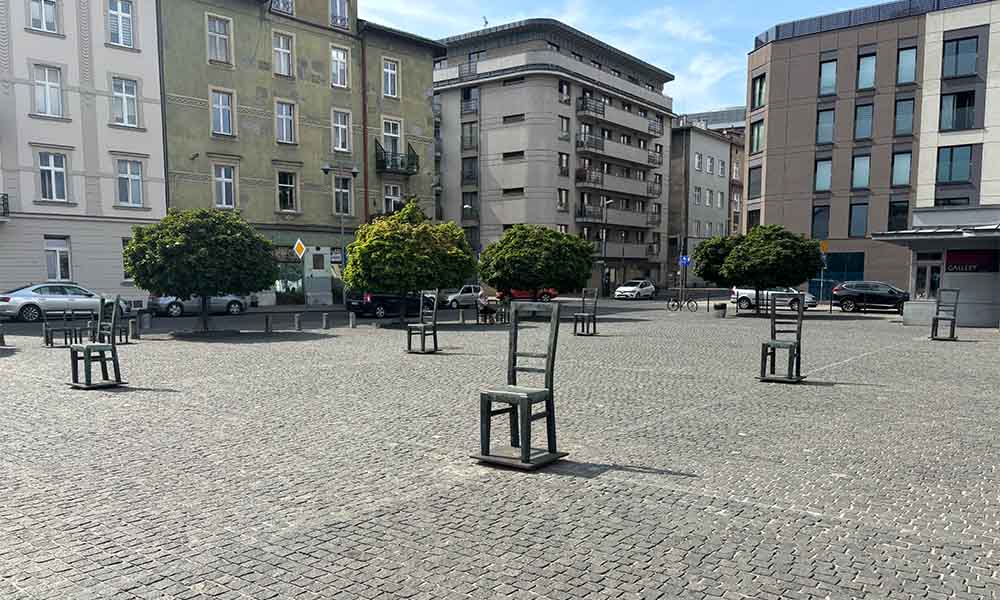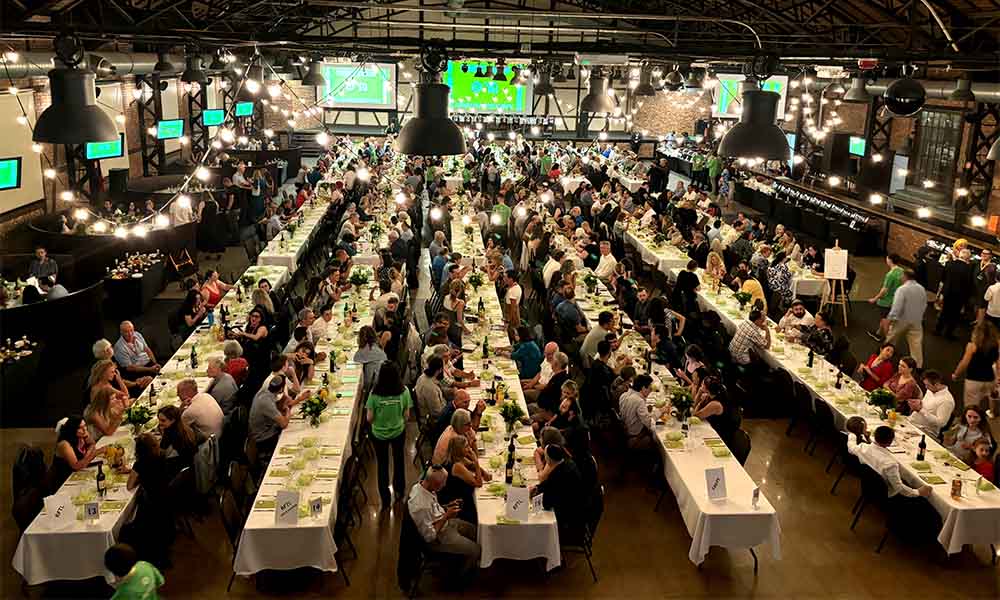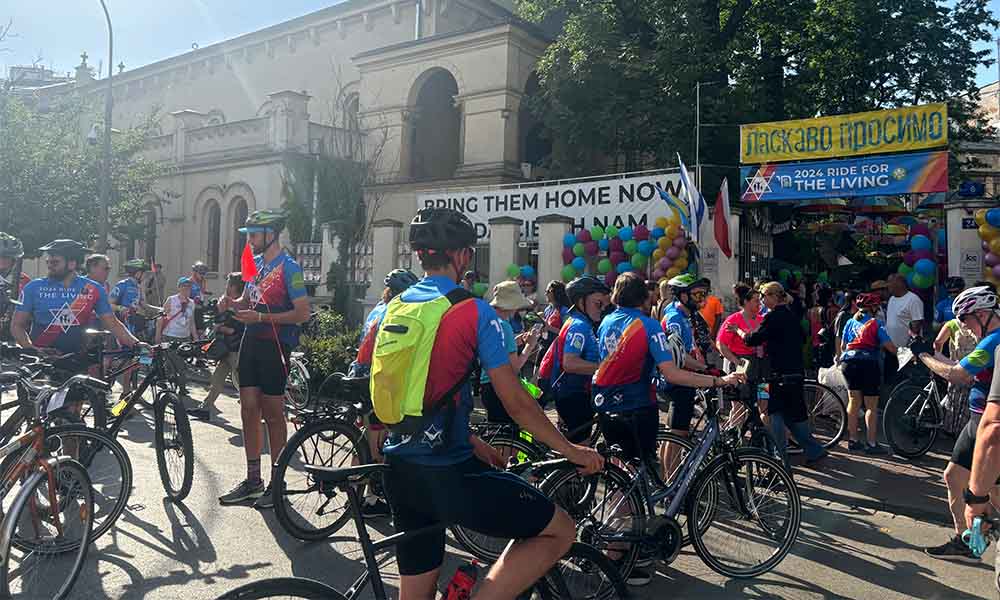
In June 2024, as summer set in and the cruel shouts of “Go back to Poland!” dissipated on college campuses, we did just that. We went to Poland on a trip hosted by the Polish government for representatives from Jewish communities.
We went back to the region where, less than a century ago, Polish Jews were subject to vicious shouts of “Juden raus to Palestine!” (Jews out to Palestine) as they were forced from their homes. Jews are painfully aware of the unbearably dark history of extermination that followed such events. For both of us, as for all Jews with European heritage, that history is deeply personal. As the granddaughter of two Polish Holocaust survivors, Laura was visiting the land where much of her family was murdered and terrorized, not only at the hands of the Nazi invaders but by local Polish nationals. It was a Polish man who helped the Nazis sort the Jews in her grandfather’s hometown of Ivye, deciding who would be interned in the ghetto for forced labor and who the Nazis and their collaborators would shoot to fall into a pit. It was a Polish non-Jew who tipped off the Nazis that much of Laura’s family was hiding in a makeshift bunker under a barn, which led to several women and children being burned alive. And when the Nazis ultimately liquidated the Ivye ghetto, local Poles lined the streets, jeering as their former neighbors were marched to their deaths. For Arnie, a trip anywhere in Eastern Europe reminds him of the Nazis’ execution of some thirty-four thousand Jews at the Babi Yar ravine in Ukraine, just outside Kyiv, undoubtedly including his own family members. While the two of us, Arnie and Laura, had not met before the trip, we quickly bonded over our shared family history and similar reactions to experiences in Poland.
The future of Jewish life in Poland is neither established nor secure, but nor is it foreclosed. Poland is an opportunity.
It is perhaps unsurprising that our friends’ and families’ responses to our trip were tepid. “Why would the Polish government want to bring a bunch of Jews to Poland?” Laura’s dad asked. Hearing of Arnie’s planned travel, a rabbi just hung his head. A few thought the trip wonderful. But overall, and as often is the case for American Jews, many of our friends and family members still consider Poland a dark and foreboding land to be avoided, except perhaps to visit the camps to bear witness to overwhelming death.
Yet, one of Judaism’s core teachings is to celebrate life—l’chaim, as we frequently toast. To life we rejoice on Purim at Hamen’s failure to destroy us. We ponder the fragility of life on Yom Kippur and acknowledge the loss of Egyptian life on Passover by spilling wine from our cups. And so, as we set out on our trip 80 years after the Holocaust, we looked at present-day Poland not with naïveté, not to forget the darkest of evils, not to blithely think of the dead and post-War traumas, but with a willingness to embrace dissonance and to search for life and light too.
The experience of Jews in World War II Poland can be understood only in historical context. A fair amount of Poland’s Jewish history is positive, at least considered against the backdrop of Western Europe’s treatment of Jews. Jews fleeing persecution during the Crusades and subsequent expulsions found autonomy and religious freedom in Poland. To be sure, conditions were not all favorable; the history of Poland is checkered with pogroms, uprisings, and antisemitism. But Poland served as a vibrant center of Jewish life and culture for significant swaths of its history. At the dawn of the Second World War, Polish Jews numbered about 3.3 million—10 percent of the country’s entire population and one-third of Europe’s Jewish population.
Then Germany and the Soviet Union invaded Poland, dividing it between themselves under the 1939 Molotov-Ribbentrop Pact and sending Poland’s government into exile. Germany breached its agreement with the Soviets in 1941, expanding further East. As a result, many Jews in Eastern Poland saw their hometowns occupied first by the Soviets and then by the Germans.
The Nazis located their death camps in occupied Poland to be close to its large Jewish population, maximizing efficiency by minimizing transportation distances. In total, they and their accomplices murdered three million Polish Jews—roughly 90 percent of the Polish-Jewish population and half of the six million Jews murdered in the Holocaust—decimating Poland’s Jewish population.
It’s well known that post-War Germany was contrite, particularly after the Nuremberg trials. West Germany admitted to horrendous wrongs, sought to return some property to Jews, paid reparations, and supported Israel’s independence. Once reunified, Germany outlawed Holocaust denialism and mandated Holocaust education, which continues to this day.
Poland holds that it was a victim of Germany and that it absolutely did not perpetrate the Holocaust. Consequently, no formal apology has ever been issued, including in the three-and-a-half decades since it escaped Soviet domination. Indisputably, and unlike Germany, Poland as a state neither organized nor conducted Holocaust crimes; as a state, Poland ceased to exist early in the War, and its religious, educational and political leaders faced persecution. But the state is one thing and the nation another. The state is the sovereign governing entity. The nation is all inclusive—the state, its territory and its people.
Is the nation of Poland morally obligated to seek forgiveness?
Many Jews, ourselves included, believe that the Polish nation bears some responsibility for the Holocaust. It is well established that Poland’s Nazi conquerors co-opted former Polish institutions, such as police forces and railroad personnel. These Poles served as tools of the Nazi machinery, guarding ghettos and helping deport Jews to camps. As Dr. Emanuel Ringelblum, whose archive we visited in Warsaw, wrote in 1943, “The uniformed police has been an enthusiastic executor of all the German directives regarding the Jews.” Amongst survivor-families, there are copious stories of Polish nationals engaging in murder, looting, and collaboration during the War. Even after Jews were liberated from the camps and forests, they faced pogroms and murder at the hands of fellow Poles. Those Jews who managed to return to their homes often found them inhabited by their non-Jewish countrymen. With many fearing for their lives, 90 percent of the surviving Jews from Poland fled the country.
While these testimonies infuse any discussion of contemporary Poland, of course there are strong counternarratives. Thousands of Poles died fighting against the Germans as part of the Home Army. Polish diplomat Jan Karski risked his life to bring secret evidence of extermination to Winston Churchill, Franklin Roosevelt, and Justice Felix Frankfurter. While some Poles betrayed Laura’s family, others helped hide, feed, and escape them. Yet many Jews feel that Nazi collaboration and complicity far outweighed resistance, and they feel rage for Poland. One professor at the Institute of Jewish Studies at the Jagiellonian University in Krakow shared with us her view that collaboration occurred in greater amounts than Poles admit but to a lesser degree than Americans believe.
Some will say that Poland’s efforts are too little and too late. Others will view Poland’s contemporary embrace of its Jewish past as a rare and beautiful development in today’s increasingly antisemitic world.
A visit to Poland does not resolve this dissonance. In fact, dissonance imbued our experience there. As we struggled to pronounce the street names in Warsaw, we considered how this foreign language once came more naturally to our ancestors than English. We admired the German architecture in Wrocław, which looked like something out of a children’s book, forcing from our minds the far more haunting images of the speeches Hitler gave from our hotel balcony. We boldly ordered foods that confused our palates but were occasionally reminiscent of those that graced Ashkenazi-Jewish Americans’ tables. And perhaps above all, we experienced a Poland that was sunny, colorful and, indeed, often beautiful, in stark contrast to the dark, depressing black-and-white photographs of the region to which we have become accustomed.
The dissonance also crept in through glimpses of our heritage. A doorframe in Kazimierz, Krakow, was scarred with the familiar outline of a mezuzah ripped off during the War. The headstones in cemeteries, such as the Okopowa Street Jewish Cemetery in Warsaw, listed names that read like Yiddish versions of so many Jewish-American surnames. Synagogues, now mostly converted to bookstores and shops, gave testimony to Jewish lives that once were.

Jewish ghetto memorial. Credit: Laura Bakst
Our more formal interactions in Poland also brought out contradictions. On the national level, Poland financially supports Holocaust studies. Many of the Holocaust-related sites and museums we visited were impressive, though largely new. The Warsaw Ghetto ruins had only recently been partially excavated, and a memorial at the site of two mass graves of Warsaw Ghetto Jews—among the largest mass graves in Europe—was completed in just 2022. Academics explained that during the period of Soviet subjugation, Poland could do little to explore its Holocaust history, though the Soviets left by the early 1990s. Representatives of institutes warmly welcomed us with lengthy presentations about their collections and ongoing investigation of wartime collaboration by Poles but could provide few details about their findings. We came to understand that some of today’s politicians are descendants of collaborators and oppose this work to avoid damage to their reputations.
Recent legal actions have also embodied this protective tendency. Poland’s 2018 Amendment to the Act on the Institute of National Remembrance prohibited public speech claiming that Poland as a state had any responsibility for or complicity in the Holocaust. Following significant international protest, the law’s criminal penalties were removed, and civil authorities maintain that it is not enforced by the government (though private individuals can still sue for alleged violations). In 2021, new legislation had the effect of significantly limiting property owners, including Holocaust survivors and their descendants, from obtaining restitution for property stolen during the Holocaust and retained by post-War communist rulers. While this law has been characterized as a statute of limitations necessary to prevent fraudulent claims, it also is dismissive of the rampant property theft from Jews for which they and their families remain largely uncompensated.
The nuances of denials, defenses and blame evaporated as we reached the gates of Auschwitz and Birkenau. These camps bring Europe’s historical antisemitism to a head—centuries of treatment of Jews as lesser, undeserving beings, as vermin. In Birkenau, the Nazis industrialized death, down to the machinery for transporting the dead into ovens. The entire history rumbles and erupts in the remnants of those gas chambers and ovens. The horror of it tears you apart. Poland has done well to preserve the camps as proof against deniers.
And then, steadying our emotions, we turned to a happier present. On the heels of visiting Auschwitz and Birkenau we attended the Krakow Jewish Festival, an annual festival started in 1988 to explore the region’s former Jewish culture and history. To some Jews, this concept can be off-putting; in a land where Jews experienced such savagery that their population has dwindled to fewer than twenty thousand, Christians (and some Jews) now want to celebrate Jewish traditions. One attendee reported that the celebration seemed philosemitic to the point of tokenizing. This was not Arnie’s reaction. At least in Krakow, the celebration felt natural and warmly healing.
 The nine-day festival included lectures, a concert by Jewish musicians, and a Shabbat dinner of seven hundred people, probably half of whom were not Jewish. Conversations during that Shabbat revealed that many Polish Christians feel a strong connection to Judaism. As the former President of Poland, Andrzej Duda, observed, “One thousand years of living next to each other; . . . in so many cases, living literally together: united by bonds of marriage, by blood ties. The truth is that nobody really knows in Poland how much Jewish blood one has in his or her veins.” Indeed, in recent years, Poland’s Jewish community has welcomed into its fold many Poles who only recently discovered their previously secret Jewish heritage. Many were descendants of hidden children during the War or of those who otherwise Christianized. There was something particularly poetic in the fact that, as we and our fellow trip participants were rediscovering our Polish roots, Poles were rediscovering their Jewish ones. This recognition is part of the modern Polish Nation, rekindling the flame of Jewish life.
The nine-day festival included lectures, a concert by Jewish musicians, and a Shabbat dinner of seven hundred people, probably half of whom were not Jewish. Conversations during that Shabbat revealed that many Polish Christians feel a strong connection to Judaism. As the former President of Poland, Andrzej Duda, observed, “One thousand years of living next to each other; . . . in so many cases, living literally together: united by bonds of marriage, by blood ties. The truth is that nobody really knows in Poland how much Jewish blood one has in his or her veins.” Indeed, in recent years, Poland’s Jewish community has welcomed into its fold many Poles who only recently discovered their previously secret Jewish heritage. Many were descendants of hidden children during the War or of those who otherwise Christianized. There was something particularly poetic in the fact that, as we and our fellow trip participants were rediscovering our Polish roots, Poles were rediscovering their Jewish ones. This recognition is part of the modern Polish Nation, rekindling the flame of Jewish life.
This brings us to the core question that we feel influences Jewish views about Poland: Is it justified to expect teshuvah, or repentance, from Poland? Can nations find holiness by deeply confessing sins, embracing goodness and offering amends? If considering the response to slavery in the United States, the answer would probably be no. In the case of post-War Germany, perhaps yes. And what would teshuvah look like for Poland, a state that itself was conquered and occupied during the period of atrocity? There is no definitive answer, only opinion.
In our view, Poland has taken some meaningful steps toward teshuvah. The Polin Museum, which opened in 2014, is a remarkable testament to 1,000 years of Jewish history in Poland. As Jews we felt very safe in Poland, during a period of increased violence against Jews worldwide, no less. Some trip members strolled around Wrocław and Krakow with kippot and large Jewish star necklaces, receiving nary a wayward glance. We were not confronted with antisemitic graffiti or signage, like we have encountered in Washington, DC, and some European cities outside Poland. We felt comfortable attending Jewish festival events that drew large crowds, even with no visible security presence. Poland is also engaging with Jews and Jewish leaders in the United States formally through its embassy. The Polish government regularly hosts trips like ours for Jewish authors and community members, including opportunities for open, unmediated meetings with senior government officials.
Some will say that Poland’s efforts are too little and too late. Others will view Poland’s contemporary embrace of its Jewish past as a rare and beautiful development in today’s increasingly antisemitic world. Recognizing that both of these positions have merit, we believe that reciprocating Poland’s efforts to warm relations—and, in doing so, urging Poland toward further progress—is nevertheless worthwhile. Speaking with government officials about Jewish concerns and priorities does more to advance Jewish interests than the generations-long boycott of Poland that some of our peers have undertaken. So too does engaging in other ways. For example, after a far-right Polish lawmaker sprayed Hanukkah candles on display in Parliament with a fire extinguisher in 2024 (he is reportedly being prosecuted), another participant of an embassy-hosted trip aptly pointed out that one way to address these sorts of actions would be to have a vote in Polish politics, and so she is applying to reclaim her Auschwitz-survivor grandfather’s Polish citizenship. Similarly, during our trip, we spoke with an artist about her advocacy work to remove “Lucky Jew” figurines depicting Orthodox men holding coins. While obviously based on antisemitic tropes, many Poles believed them to be good-luck charms. It was not until Jewish visitors and advocates began raising awareness about their problematic nature that they were finally removed from shelves and banned from shops on Krakow city property in 2021. While these figurines were once ubiquitous, we found only one store selling them during our three days in Krakow. As we know from the American experience, removing societal bigotry takes generations.

Finish line of “Ride for the Living” in Poland. Credit: Laura Baskt
On a Friday afternoon in Krakow, we cheered on cyclists as they completed the 2024 Ride for the Living, a 60-mile bike ride from the gates of Birkenau to the Krakow Jewish Community Center. The sentiment was jovial as Queen’s “We Are the Champions” blasted from the speakers and people waved flags and blew bubbles. The entryway to the JCC could not have been more inviting; its courtyard was decorated with balloons, flags, and rainbow umbrellas suspended overhead. It also showcased posters of Hamas hostages and a small Shabbat table for the abducted Bibas family (the father was ultimately released alive while his wife and two young children were returned deceased). The moment encapsulated much about our experience in Poland: the Jewish joy and pride that is inherently tied to a recognition of our persecution; the understanding that while we stood on the ashes of some of the most vibrant Jewish communities and in the shadows of Nazi death camps, we were also witnessing reconstruction and renewal on land that, in earlier centuries, proved a welcoming home.
In that moment, Laura thought of her grandfather, who suffered so immensely for his religion but never lost faith; the man who sang lovingly in Yiddish to her as a child, who brought tears to many eyes as he davened the Musaf service at her bat mitzvah with gut-wrenching emotion, and who somehow managed to embody the value of chai despite losing nearly his entire family in the Holocaust. Arnie thought about how the world will not let us be, how it insists on persecuting Jews, but how by choosing life, looking toward the light and studying our Torah, we survive and even thrive. The future of Jewish life in Poland is neither established nor secure, but nor is it foreclosed. Poland is an opportunity. As an Israeli living in Krakow explained to Arnie, Poland today provides safety, security, and economic opportunity for Jews.
As both our history and current events teach, any place can become unsafe for Jews. So much of Jewish joy and pride stems from a recognition that our continued existence—our life—is a miraculous, fragile feat. The revitalization of Jewish life in Poland is one such feat. We are grateful to the many people we met on our trip, for the work they’ve undertaken to protect and grow that community and whose efforts we are now honored to be a small part of.


Laura Bakst is a litigator; the granddaughter of two Holocaust survivors; and the author of The Shoemaker’s Son, which documents her family’s survival and resistance stories. She speaks about the Holocaust and antisemitism in public schools.
Arnold Podgorsky is the chair of the Masorti Foundation for Masorti/Conservative Judaism in Israel; past president of Adas Israel Congregation in Washington, DC; and a now somewhat retired litigator and energy lawyer.

2 thoughts on “Travel and Teshuvah: Our Tour Through Poland’s Contradictions”
Poland has no responsibility whatsoever for what happened on its territory under German, then Soviet, occupation. Of course, there was antisemitism, however one defines that, but that was basically everywhere in the world then, including the US. Where most articles like this one fail, is that they neglect to address the social context in interwar Poland. To better understand this social situation, one must read Prześniona rewolucja, by Professor Andrzej Leder. The title of the book in English means the sleepwalked or dreamed revolution. I believe the book is only available in Polish, but there are lectures by Professor Leder in English on YouTube. The book explains how Poland changed from a basically feudal society to the modern, mostly middle class country it is today.
My husband and I spent a week in Poland in 2019 sponsored by the Taube Foundation. There were many times during those seven days that I felt like a schizophrenic who could not tell one reality from another. Who were the murderers and who were the heroic rescuers? The annual Jewish Music Festival is another such moment. Thousands of attendees, most of whom are not Jewish roamed the streets and attended the numerous events. Why?
Where would the effort to restore Jewish life in Poland go? An American rabbi has been there since 1992 where he has nurturing 13 other rabbis in major cities who serve small Jewish populations. A functioning JCC and numerous American sponsored organizations are there.
If it worth the effort? A great question with no clear answer.